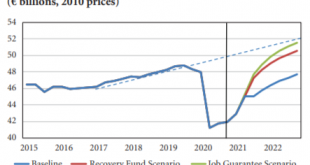Michael Stephens | April 28, 2021 Senior Scholar Rania Antonopoulos recently participated in a webinar for the European Trade Union Institute, during which she discussed the rationale behind and experience with the implementation of the “Kinofelis” direct job creation program—a limited job guarantee for Greece. Watch her presentation below (accompanying slides are here). The Levy Institute’s previous Strategic Analysis for...
Read More »Direct Job Creation in Greece
Michael Stephens | April 28, 2021 Senior Scholar Rania Antonopoulos recently participated in a webinar for the European Trade Union Institute, during which she discussed the rationale behind and experience with the implementation of the “Kinofelis” direct job creation program—a limited job guarantee for Greece. Watch her presentation below (accompanying slides are here). The Levy Institute’s previous Strategic Analysis for...
Read More »The “Thing” with Job Guarantee Programs…
In a February 18th front page article in the business section of the New York Times, Eduardo Porter surveys the potential for a job guarantee program. After starting with the caveat issued by Republican politicians—why trust your life choices to bureaucrats?—the piece goes on to present opinions of various experts on employment programs. It is noteworthy that even among the specialists, not one has ever been involved in actual fieldwork or research in the various experiments with job...
Read More »The “Thing” with Job Guarantee Programs…
In a February 18th front page article in the business section of the New York Times, Eduardo Porter surveys the potential for a job guarantee program. After starting with the caveat issued by Republican politicians—why trust your life choices to bureaucrats?—the piece goes on to present opinions of various experts on employment programs. It is noteworthy that even among the specialists, not one has ever been involved in actual fieldwork or research in the various experiments with job...
Read More »The “Thing” with Job Guarantee Programs…
In a February 18th front page article in the business section of the New York Times, Eduardo Porter surveys the potential for a job guarantee program. After starting with the caveat issued by Republican politicians—why trust your life choices to bureaucrats?—the piece goes on to present opinions of various experts on employment programs. It is noteworthy that even among the specialists, not one has ever been involved in actual fieldwork or research in the various experiments with job...
Read More »The IMF as Deficit Owl? What’s Wrong with This Argument?
It seems the IMF aviary has turned on the hawks and embraced the deficit owls. Has the IMF joined the policy shift to MMT? Yes, in part, but it appears to be a viral form of MMT: according to Vitor Gaspar, the IMF’s head of fiscal policy, “Nations’ first priority should be vaccination, while the reduction of public debt is now far down the list of urgent actions… the main role of fiscal policy in the immediate future should be to be stimulative, to help restore economic growth, reduce...
Read More »The IMF as Deficit Owl? What’s Wrong with This Argument?
It seems the IMF aviary has turned on the hawks and embraced the deficit owls. Has the IMF joined the policy shift to MMT? Yes, in part, but it appears to be a viral form of MMT: according to Vitor Gaspar, the IMF’s head of fiscal policy, “Nations’ first priority should be vaccination, while the reduction of public debt is now far down the list of urgent actions… the main role of fiscal policy in the immediate future should be to be stimulative, to help restore economic growth, reduce...
Read More »Jiu-Jitsu Comes to the Stock Market
The core philosophy of this Japanese defensive art used by the weak against the stronger Samurai is to mobilize the opponent’s greater force to your own advantage. Many have criticized the run-up in the quotation of the GameStop shares as a violation of market principles or regulations. Far from it, it simply represents the fact that day traders may be dumb money, but they have understood how to apply jiu-jitsu. If the intent was simply to profit from trading the stock, no retail trader...
Read More »Jiu-Jitsu Comes to the Stock Market
The core philosophy of this Japanese defensive art used by the weak against the stronger Samurai is to mobilize the opponent’s greater force to your own advantage. Many have criticized the run-up in the quotation of the GameStop shares as a violation of market principles or regulations. Far from it, it simply represents the fact that day traders may be dumb money, but they have understood how to apply jiu-jitsu. If the intent was simply to profit from trading the stock, no retail trader...
Read More »Why “Output Gap” Is Inadequate
by Lekha Chakraborty and Amandeep Kaur[1] The macroeconomic uncertainty during the Covid-19 pandemic is hard to measure. Economists and policymakers use the “output gap” variable to capture “slack.” It is a deviation between potential output and actual output, which is a standard representation of a “cycle.” The potential output is an unobserved variable. There is an increasing concern about the way we measure potential output—decomposing the output into trends and cycles. This is...
Read More » Multiplier Effect
Multiplier Effect


